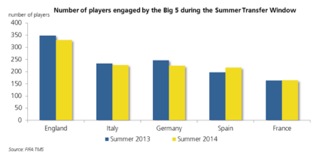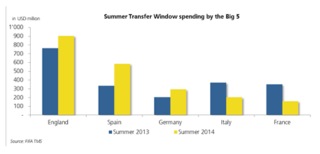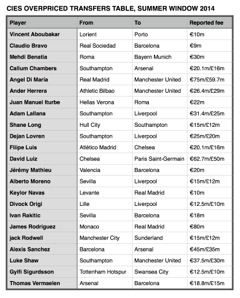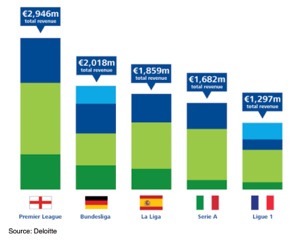“To be brave, by definition, one has first to be afraid.” Robert Harris, Pompeii
There is no questioning the boldness of Premier League clubs’ activity in the transfer market this summer. The £835 million (€1.049 billion) in gross spending on new players exceeded the gross domestic product of San Marino or Gibraltar. When I wrote here three months ago that a financial volcano was primed to erupt in English football, I was not wrong [see first related article below].
The expenditure exceeded previous records by almost a third, according to figures released by the Deloitte Sports Business Group on Tuesday. In a single summer’s swoop, Premier League clubs have spent more on transfers than over any 12-month period ever before. It was also virtually double the amount any other country committed.
The £425 million (€533.8 million) of transfer spending in Spain’s Primera Liga amounted to only 50.9% that of the Premier League’s. In Serie A £260 million (€326.6 million) was spent, the Bundesliga £250 million (€314 million) and in France’s Ligue 1, where Paris Saint-Germain have been chastened by UEFA’s Financial Fair Play rules, a relatively frugal £100 million (€125.6 million) went out.
But England’s demonstration of financial firepower should not be considered a negative for clubs in other jurisdictions. There was £530 million (€665.6 million) of gross spending on players from overseas clubs, empowering sellers to invest in replacement talent. By contrast they sold their assets off relatively cheaply to foreign buyers, with only £280 million flowing back to England from clubs in other countries. When set against the €2.946 billion of total 2012-13 revenue for English clubs (which has since risen substantially, it must be noted) the €1.049 billion spent demonstrates a big commitment. Indeed one club alone – Manchester United – spent around £150 million on new players. There were perhaps signs that some of the expenditure was beyond even the richest of English clubs’ means [see second related article below].
So these are the raw data, but it is in their analysis that we can learn more. England’s capacity to spend is intrinsically greater than that of its European rivals. Despite general disdain for the UEFA FFP regulations among the English, by constraining expenditure relative to revenue, they do benefit the Premier League commensurately more than clubs in any other country, where revenues are broadly lower.
Turnover across the big-five leagues, 2012-13
It would seem reasonable to extrapolate that the money flows are producing a concentration of quality in England. Premier League clubs bought about 330 players this summer, according to figures released on Tuesday by FIFA’s Transfer Matching System. This put the mean expenditure per player at £2.5 milliom. Spanish clubs spent less than £2 million on average on each player, with German and Italian clubs committing little more than £1 million on each.
Number of players engaged across the big-five leagues, 2014 summer window

Transfer spending across the big-five leagues, 2014 summer window

But these figures cannot account for value. And this is where analysis by the International Centre for Sports Studies [CIES] provides a fascinating insight. Its research found that of the 23 players clubs paid excessively for, by far the majority were transferred to English clubs.
These included Angel Di María, for whom United overpaid Real Madrid by €30 million according to the CIES, and his new team-mates Ander Herrera and Luke Shaw. Several of the players Liverpool acquired this summer (Adam Lallana and Dejan Lovren from Southampton, Alberto Moreno from Seville and Divock Origi from Lille) cost more than the CIES considers them to be worth. In all, English clubs overpaid for 15 of the 23 the CIES considered too expensive.
CIES transfer analysis

But a closer analysis of these findings suggests not that Liverpool and Manchester United have been profligate, rather that anyone who is conspicuously wealthy must pay more for the assets they desire. This is consistent with Arsenal, Bayern Munich, Barcelona, Chelsea, Paris Saint-Germain and Real Madrid all also featuring on the CIES list.
And for this reason all English clubs appear to have been obliged to spend more than their counterparts during the summer 2014 window. It is clear to the world that the Premier League has the most cash at its disposal, so the rest of the world seeks to force it to part with as much of that cash as it possibly can.
The English clubs have not been unwilling to do so because there is so much at stake. Those at the top of the tree must maintain a strong level of player investment to retain their positions in the Champions League elite. (And, as discussed in the first related article, have a long way to go to catch up with the very best of the Champions League crop.)
But as the riches on offer in the Premier League itself have continued to grow exponentially, the risk and the cost of failure has massively increased. The risk because the equal share of distributions from central broadcasting and commercial revenues has risen relative to what is handed out on merit for performance. That now stands at £1.044 billion of the total £1.563 billion given to competitor clubs by the Premier League, or 66.8%. The cost of failure has increased because dropping down from the top flight into the Championship, England’s second tier, is to fall into the financial abyss, albeit with a “parachute payment” to soften the descent.
In the seven seasons between 2006-7 and 2012-13, only eight of the 21 relegated clubs managed to return to the Premier League, and one of them has since fallen back again. That one-in-three return rate is a frightening prospect for any club executive. With this fear of relegation gnawing at them daily, it is small wonder they are so bold with the sums they spend.
Related articles:
http://www.insideworldfootball.com/matt-scott/14756-att-scott-premier-league-transfer-volcano-looks-primed-to-erupt
http://www.insideworldfootball.com/matt-scott/15343-matt-scott-blessed-are-the-weak-as-enfeebled-united-now-look-to-inherit-the-earth
Journalist and broadcaster Matt Scott wrote the Digger column for The Guardian newspaper for five years and is now a columnist for Insideworldfootball. Contact him at moc.l1722042881labto1722042881ofdlr1722042881owedi1722042881sni@t1722042881tocs.1722042881ttam1722042881.

